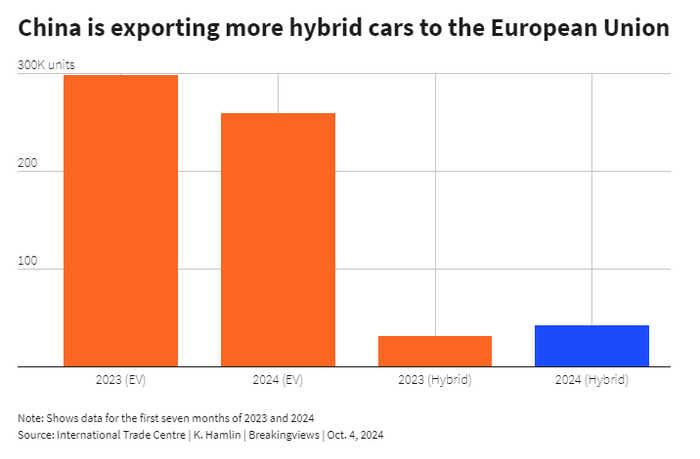Published 07:26 IST, October 7th 2024
EV tariffs are only the first step in EU-China war
After Friday’s narrow vote, the European Commission is still talking with China to see if an alternative to tariffs is possible.
- Economy
- 4 min read

First blood. The European Union has got its electric vehicle tariffs through. On Friday, member states voted for levies on battery cars imported from the Middle Kingdom. Given big EU hitters like Germany opposed the move, European Commission boss Ursula von der Leyen has avoided looking weak. But EV tariffs won’t tackle China’s growing clout in hybrid vehicles and critical batteries, or stop trade tensions spreading to other theatres.
After Friday’s narrow vote, the European Commission is still talking with China to see if an alternative to tariffs is possible to address what it sees as the Middle Kingdom’s “injurious” support of its auto sector. However, the bloc now looks likely to impose additional duties of up to 35% on imports from Chinese players including BYD and SAIC. That will reduce their ability to undercut European players like Volkswagen or Renault and incentivise them to build factories on the continent. Yet tariffs won’t freeze China out. And they leave European incumbents exposed on other fronts, just as auto sales on the continent stutter.
One key separate pressure point will be hybrid vehicles, which use both gasoline and batteries and are not clobbered by the levies. Chinese players are already selling more of these cars, helped by their vast scale at home. Their timing is just right to ride a boom that has seen these models massively outsell battery electric vehicles. Underpinning China’s dominance in both pure electric and hybrid models, meanwhile, are batteries. These can make up some 40% of the value of a car. BYD and compatriots account for around two-thirds of global sales. Their scale and domestic subsidies mean cells made in China can be as much as a third cheaper than in Europe, says S&P Global. Although Brussels is encouraging local manufacturing, Chinese players increased exports to the EU to $23.4 billion last year, 10 times more than volumes five years earlier. The local supply chain risks becoming dependent on China, and less able to invest in new technologies.

Europe isn’t sitting idle. The bloc, and member states, are backing homegrown players, and using legislation like the Net-Zero Industry Act and the Batteries Regulation to incentivise domestic production. But European would-be champions like Sweden’s Northvolt are still struggling. Chinese players in contrast are growing and gaining greater support: Contemporary Amperex Technology’s subsidies rose by 35% in the first half of the year. A slowdown in EV sales will make it hard for European players to catch up.
Jacking up tariffs on Chinese batteries from the current 1.3% or piling on duties for hybrids would be tricky, given Europe’s deepening reliance on Middle Kingdom exports. And it may risk a further trade war, incentivising China to hit back on sensitive exports like battery materials, or indeed spread hostilities to sectors like European luxury goods. Yet given how far Europe is behind China, such frictions may be inevitable.
Context News
The European Commission said on Oct. 4 it had received enough support in a vote among European Union members to impose tariffs of up to 45% on imports of Chinese-made electric vehicles. In the vote, 10 EU members backed tariffs and five voted against, with 12 abstentions, Reuters reported, citing EU sources. That would not be enough to block the proposal, giving the Commission the ability to impose the tariffs. The Commission said in a statement that it would need to publish an implementing regulation by Oct. 30 for the tariffs to apply. It would also continue to “work hard” on an alternative solution with China, it said. Any alternative would have to be “fully (World Trade Organization)-compatible, adequate in addressing the injurious subsidization established by the Commission’s investigation, monitorable and enforceable,” the Commission said.
Updated 07:26 IST, October 7th 2024